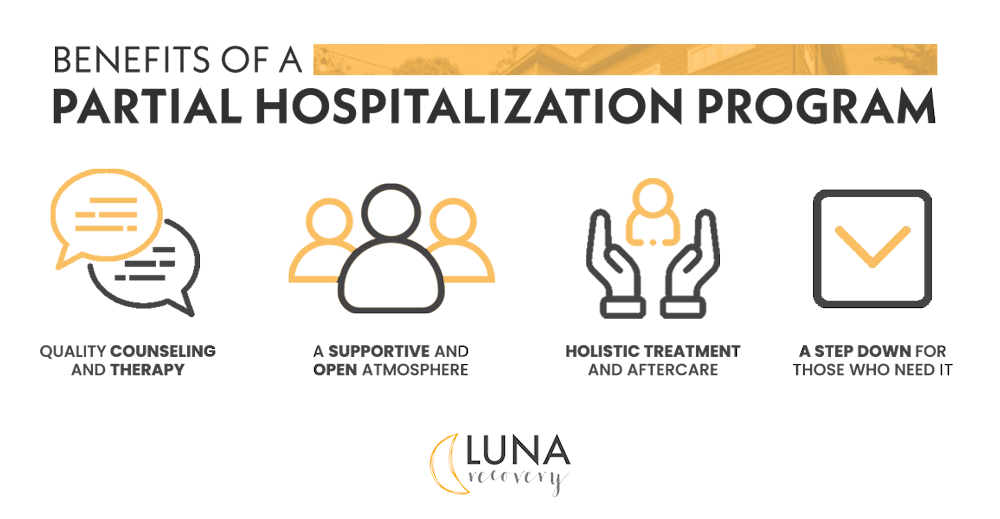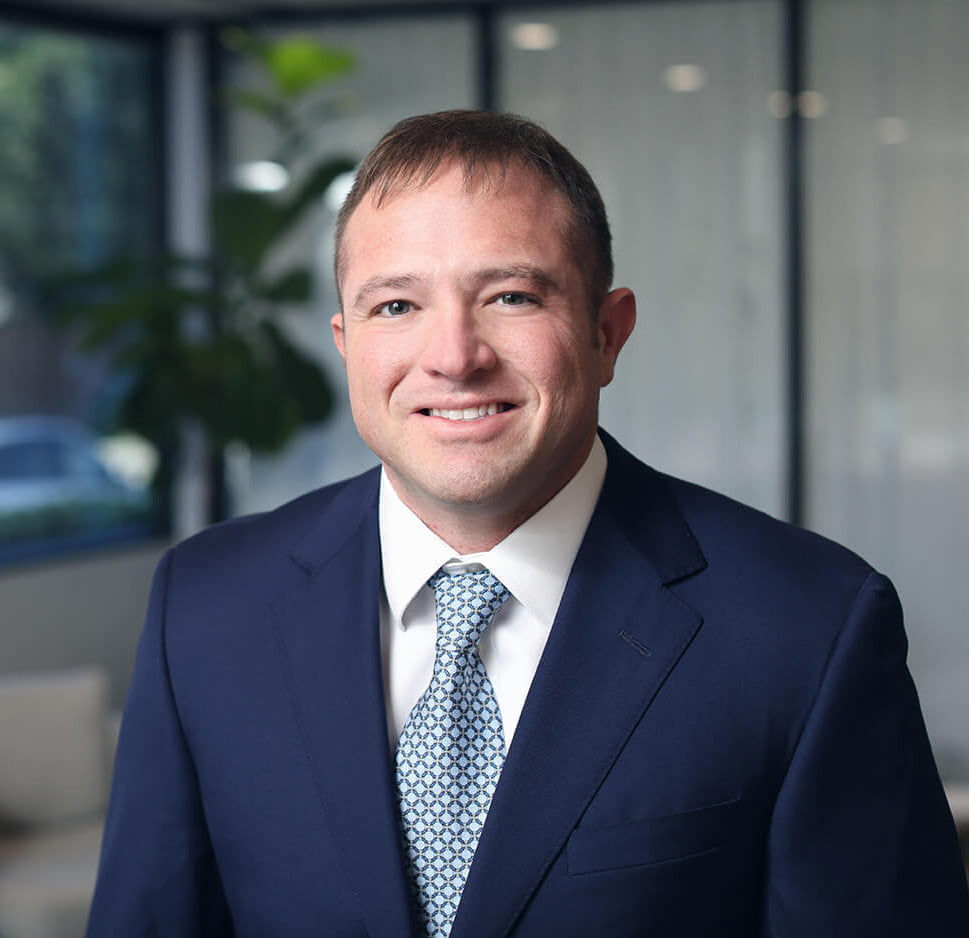Partial Hospitalization Program in Houston, TX
Various obstacles can prevent someone from living their greatest life. Breaking the dangerous cycle of addiction is an extremely strenuous task. While the first step is to ask for help, many don’t or aren’t able to receive the treatment they need to get their life back on track.
If you or a loved one needs help conquering addiction or psychiatric challenges, at Luna Recovery Services in Houston, Texas, our facility offers outpatient rehab services such as a partial hospitalization program to treat various types of substance use disorders (SUDs).
Our comprehensive programs are designed to help someone overcome recovery barriers, and effectively cope and manage their addictive habits to live a better, healthier future.
PHPs offer full-spectrum care, including a comprehensive evaluation, a customized treatment plan tailored to one’s specific needs, and post-care considerations designed to help someone overcome recovery barriers.
This option for day treatment doesn’t actually require hospitalization. Individuals in our PHP receive a minimum of 25 hours of clinical and medical care four days a week. They engage in effective rehab treatment while living in the comfort of their own home or in a sober living environment.
At Luna Recovery Services in Houston, TX, individuals have the opportunity to receive effective addiction treatment while living independently, or in a sober living environment. Our methods have proven to be effective in teaching the necessary skills needed to cope with and manage addictive habits to live a better, healthier future. We will accompany you every step of the way, from beginning to end, and after treatment too.
Comprehensive clinical programming for
a high level of assistance in a short amount of time
What is A Partial Hospitalization Program (PHP)?
A partial hospitalization program (PHP) is a type of outpatient treatment that provides help to people struggling with addiction. When an individual enters a PHP, they receive a higher level of care than the standard outpatient care program. They will receive comprehensive treatment services and medical supervision during the day, but they will not stay overnight in the treatment center.
PHPs are sometimes called day treatment programs. They offer outpatient addiction treatment services including:
People generally go to sessions at the recovery center 4 or 5 days a week for 4 to 6 hours per day. This is a more intensive program than other outpatient programs which may only meet once or twice a week.

Step-Down
 Partial hospitalization programs are good for people who no longer require 24-hour supervision, but still, need a high level of support.
Partial hospitalization programs are good for people who no longer require 24-hour supervision, but still, need a high level of support.
Some people use PHP as a “step-down” from a residential treatment program depending on a variety of factors.
Luna Recovery in Houston, TX, also offers a residential treatment program for people with severe addictions and mental illness. Our team of addiction specialists will figure out what level of care is the best option for you or your loved one.
Medical Detox
Medically supervised detox is not a replacement for treatment and is the first step in the process of recovery. Detoxification is not offered in all Partial Hospitalization Programs. However, some have physicians available to provide medical support to help people withdraw safely from drugs or alcohol. Rehab facilities that offer medically-assisted detox (MAT) treat people with mild to moderate withdrawal symptoms. If you have severe or life-threatening symptoms, you may need the aid of a professional detox center before beginning treatment.
Medical Services
Doctors and nurses are on staff to give medication and treat any complications that might arise as a result of substance abuse or other medical conditions.
Medication Management
When recovering from certain types of substance use disorders (SUDs), many people benefit from medication. There are FDA-approved medications for certain addictions that may help decrease cravings, block rewarding effects and manage withdrawal symptoms.
Individual Therapy
During individual therapy for substance abuse, a person will meet with a therapist or drug counselor in one-on-one sessions to work on unhealthy behaviors. This will help you maintain long-term abstinence.
Group Therapy
During group therapy for substance abuse, sessions tend to concentrate on one certain topic or skill and are conducted by a mental health professional. Topics may include:
- Educational groups
- Relapse prevention
- Managing stress
- Coping skills
- Life skills
- Recreational activities
- Family education and therapy
Aftercare Planning
Your treatment team prepares you for leaving treatment by designing an aftercare plan which might include relapse prevention strategies such as:
- 12-step programs
- Support groups
- Sober living homes
Holistic Treatment
Our facility offers holistic treatment options such as yoga, meditation, and mindfulness training.
Dual diagnosis Treatment
Our partial hospitalization program provides dual diagnosis treatment for people suffering from co-occurring disorders, which refers to having a substance use disorder and a mental health disorder simultaneously.
Comprehensive Clinical Programming in a Short Amount of Time
Clients at Luna Recovery Services are given comprehensive clinical programming including:
- Education
- Counseling
- Group process work
- Daily structure and medical support are key components of our PHP in Houston.
Day treatment is suitable for those who need a high level of accountability and assistance in a day treatment program, but for personal or financial reasons are unable to enroll in residential treatment.
Clients at Luna Recovery Services are given comprehensive clinical programming including education, counseling, and group process work. In addition, daily structure and medical support are key components of PHP.
Day treatment is suitable for those who need a high level of accountability and assistance in a day treatment program, but for personal or financial reasons are unable to enroll in residential treatment.
This program consists of:
8 to 24 sessions
This treatment course is based on need, preference, and progress.
Potential additional time
Additional time in treatment may be recommended and will be determined together with your collaborative treatment team.
Comprehensive assessment and treatment planning
First, you’ll engage in an assessment session with one of our licensed, trained professionals. You and your primary therapist will then develop a treatment plan that meets your needs as you progress.
Medical and psychiatric care
To ensure that your health is addressed as you move through treatment, you’ll meet privately with our board-certified physician and our psychiatrist on a weekly basis.
Individual counseling sessions
A licensed primary therapist will meet with you at least once per week outside group hours. Your therapist will help you define your treatment goals and work through any issues that may arise. Together, you’ll develop a comprehensive discharge plan to ensure you’re ready to move forward.
Group therapy sessions
Group therapy sessions give you the opportunity to learn and heal in a community environment. Guided by a licensed counselor, you and your peers will share issues, emotions, and experiences in a safe space.
Psychoeducation
Educational groups focused on the biological, psychological, and neurological aspects of substance abuse.
Family Support
As with all our programs, we believe that family members should be included in the treatment process. To that end, we hold weekly family education groups. Additionally, your primary therapist can provide family counseling sessions as necessary.
Technical Used:
Cognitive-Behavioral Therapy (CBT)
This type of talk therapy is based on behaviorism (the ways that behavior can be controlled or changed) and cognition (which focuses on understanding how people feel, think, and see themselves in the world around them). CBT looks at the way your behavior is linked with your cognition and how your thoughts and beliefs influence your addictive behavior.
Dialectical-Behavioral Therapy (DBT)
DBT is a type of CBT that focuses on accepting your experiences. During DBT you learn to identify and change negative thinking patterns and behaviors while encouraging positive results.
Mindfulness Practices
Mindfulness is a method adapted from meditation practices. It emphasizes focusing on your breathing to help you “live in the present.” These breathing techniques help you slow down the situation and learn to separate your thoughts from your emotions.
Addiction Medicine
Addiction medicine is concerned with these treatment goals in mind:
- Prevention
- Evaluation
- Diagnosis
- Treatment, and recovery of people with the disease of addiction
Who Is a Good Candidate for a Partial Hospitalization Program?
Generally speaking, PHPs are best for people who:
- Need close medical monitoring, but don’t need it 24 hours a day.
- Need more support than what is provided in standard outpatient programs
- Have reliable housing and transportation
- Have a stable support system at home
- Can not take time out from work or school
- Only have mild to moderate withdrawal symptoms
How Long Do Partial Hospitalization Programs in Houston Last?
 The length of time spent in a partial hospitalization program varies depending on your needs. Each PHP has a different approach and every person is unique. For treatment to be effective, it has to be for an adequate amount of time so you can build healthy behavior patterns. That’s why our Partial hospitalization in Houston will structure a treatment plan to meet your recovery needs and requirements.
The length of time spent in a partial hospitalization program varies depending on your needs. Each PHP has a different approach and every person is unique. For treatment to be effective, it has to be for an adequate amount of time so you can build healthy behavior patterns. That’s why our Partial hospitalization in Houston will structure a treatment plan to meet your recovery needs and requirements.
After completing a PHP, you may transition to a more traditional outpatient program. At Luna Recovery Services, we offer an Intensive outpatient program (IOP) which is less structured than PHPs but still more comprehensive than a typical outpatient program (OP). These evidence-based programs have helped individuals maintain their sobriety for the long term.
How Much Does a Partial Hospitalization Program in Houston Cost?
The costs of a PHP will vary based on several factors including:
- The length of the program
- How much is covered by your insurance
- Location of the facility
- Services offered
However, a PHP is less expensive than a residential or inpatient program because you don’t live in the facility full-time. In addition, insurance providers are more likely to cover an outpatient program compared to a residential program.
Every insurance plan is different but many providers do offer some level of coverage for addiction treatment. Because it’s now considered an essential health benefit in the Affordable Care Act (ACA), many insurance companies cover substance abuse treatment in the same amount that they cover other medical conditions.
Other Levels of Care Offered at Luna Recovery
The American Society of Addiction Medicine (ASAM) views treatment as a continuum marked by 5 basic levels of care. Luna Recovery offers other treatment options including:
Level 0.5: Early Intervention
Professional services for early intervention for people who are at high risk for developing a SUD.
Level I: Outpatient Services
Organized, non-residential services provided in regularly scheduled sessions. This level has been expanded to provide access to care for dual-diagnosis patients, unmotivated patients who have been assigned to treatment, and other people who used to only have access to care if they agreed to intensive periods of primary treatment.
Level II: Intensive Outpatient/Partial Hospitalization Services
Level II delivers treatment services during the day, before or after work or school, in the evenings, or on weekends. For certain people, these programs provide essential education and treatment elements while still allowing patients to live at home and use their new skills in “real world” environments. Programs may arrange for medical and psychiatric treatment, medication management, and 24-hour crisis services.
Level III: Residential/Inpatient Services
Level III includes a planned regimen in a 24-hour live-in facility. They stick to a defined set of policies and procedures and are either housed in or affiliated with permanent facilities where patients live.
Level IV: Medically Managed Intensive Inpatient Services
This level provides a 24-hour regimen of medically directed treatment of mental and substance-related disorders in an acute care inpatient setting. Level IV serves patients whose substance-related and mental problems are so severe that they need primary biomedical, nursing, and psychiatric care.
Begin Your Recovery Today at Luna Recovery Services
Our partial hospitalization program in Houston is an excellent way to begin your recovery journey. The professional addiction specialists at Luna Recovery in Houston, Texas can help you create a program specifically for you or a loved one. And if it becomes necessary, we have interventionists who can help you plan an intervention.
Our rehab facility can help you break the cycle of addiction and change your life! Take that important step and contact us today.
Dr. Allaire received his Bachelors of Science in Biology from the University of Houston, as Valedictorian of the College of Natural Sciences and Mathematics, and his Medical Doctorate from Baylor College of Medicine, where he served as Chief Resident. He is the medical monitor for the Physician Counseling Committee of the Harris County Medical Society and the Medical Director of Serenity House Detox. Dr. Allaire specializes in medically assisted detox cases, treating patients in recovery from addiction or other mental health disorders, the medical assessment and monitoring of patients with addictive disorders, medical care related to eating disorders and the medical treatment of patients with mental health conditions.



